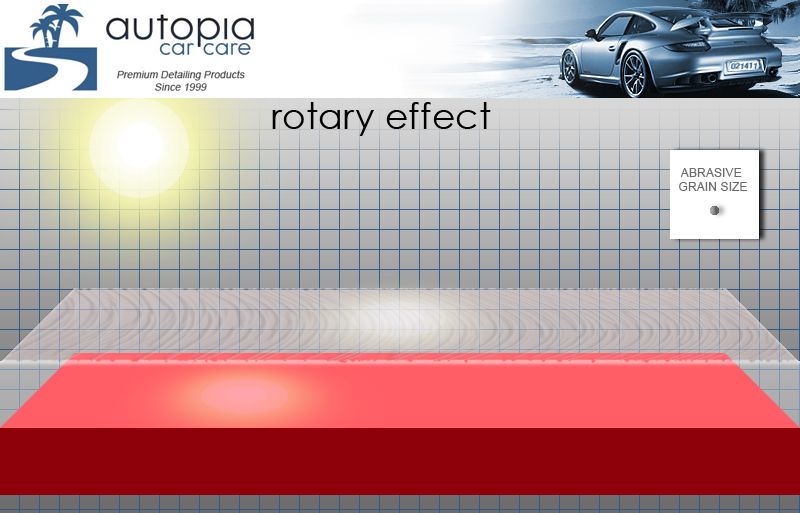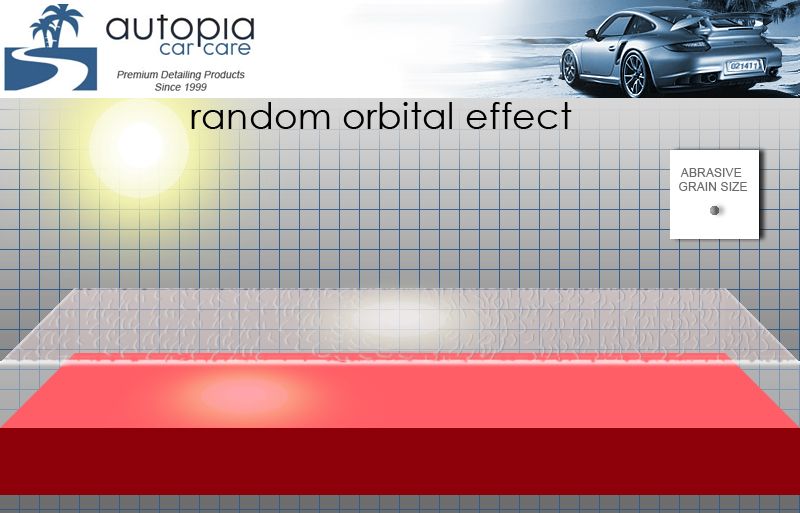Chevy vs. Ford?
Ali vs. Frazier?
Pearl Jam vs. Nirvana?
Earnhardt vs. Gordon?
Senna vs. Schumacher?
Every generation and every genre has its rivalries. Perhaps you know some or all of the names above. When it comes to polishing paint, the debate on which will create a better finish, the rotary or random orbital polisher, rages on.
Rotary guys say that the rotary provides a better finish. Some of the reasons stated:
- It creates more heat
- It creates a more precise finish
- It breaks down the abrasives in a more even, more uniform manner
Random Orbital users contents that their dual-action polisher reigns supreme because:
- It creates less heat
- It creates less visible swirl marks
So what`s the truth? Which machine (rotary or random orbital) creates more gloss?
Smooth = Gloss
All things being equal, the paint with a smoother surface will reflect more light. This is true of any reflective surface. If we want to be completely accurate, the surface with a smoother finish will reflect the same amount of light, only it will do so more accurately, so that our eyes perceive more gloss.
So the real question is which polisher creates a smoother surface, the rotary or random orbital?
All Polishes Scratch
The second point to consider is that all abrasive machine polishes leave scratches in the paint. Polish grains (abrasives), in order to work, have to be harder than the paint`s surface. As they tumble, rub or slide across the paint, they remove small impressions in the surface (usually 1/3 or less the size of the actual abrasive).
Building further on this, it is important to remember that modern abrasives are both designed to break apart and are extremely fine.
While these charts (below) were originally designed to display the difference between SMAT (super micro abrasive technology/non-diminishing abrasives) and DAT (diminishing abrasive technology) they hold some relevance for this post.
Regardless of the abrasive type used and the type of machine it is applied with, it is important to remember these facts:
- The finer the abrasive, the finer the scratch pattern left behind.
- The finer the scratch pattern, the smoother the surface.
- The smoother the surface, the more the light is reflected accurately.
- The more the light is reflected accurately, the greater the perception of gloss.
Since the abrasives used in polishes have to be harder than paint to work, they have to be engineered to break apart or fracture, as the diminishing abrasive chart above demonstrates.
Non-diminishing abrasives are already "broken apart" and produce an extremely fine scratch pattern immediately.
Diminishing abrasives require some level of friction to fracture apart. However, rubbing a small amount of polish between your fingers will produce more than enough friction to quickly break modern diminishing abrasives apart.
While older, larger silica-based and diatomaceous earth abrasives could require a significant amount of friction to diminish, modern polishes simply do not. Regardless of the machine you use, modern abrasive technology will allow you to break down the abrasives fairly quickly.
Your Pad Plays A Role
Your polishing pad of choice plays a huge role in the finish quality you can achieve. The abrasive imprint left behind on the paint is partially controlled by how much the abrasive pushes into the pad as well as how well the pad`s foam wall`s squeegee the surface clean and entrap spent- abrasive material/paint residue.
Because an article, much longer than this, could be spent on how pad dynamics affect the polishing process, and the effect of different machines on pad dynamics, we will simply state that "all things being equal" applies to this article. This assumes, for this article, that the pad affects the abrasives identically (in terms of material capture and abrasive imprint).
Rotary vs. DA? What`s The REAL Difference?
So far we have established the following:
- Smoother paint reflects more light.
- Modern abrasives will break down with minimal friction.
The main difference between a rotary and a random-orbital, dual-action polisher is the way they move the abrasives across the paint.
Rotary polishers are direct drive, and move the pad in a singular, planing motion across the paint.
Dual-Action Random Orbital polishers move the the pad in an orbital (tiny circles around a central point) motion as well as a spinning motion, creating a curly-q action.
The actions of each machine are illustrated in the diagram below:
Since the goal in creating a better finish boils down to leaving behind a smoother finish, which motion creates a better finish?
The simple answer is neither! All things being equal, both machines will leave similar-sized impressions in the paint, with the main difference being the scratch pattern left behind.
The diagram below shows the microscopic scratch pattern created by a rotary polisher:
The diagram below shows the microscopic scratch pattern created by a dual-action random orbital polisher:
Because the scratch pattern of a dual-action random orbital polisher is dispersed across the paint in seemingly random pattern, it is LESS likely that you will see the scratch pattern.
IF you see a scratch pattern left behind by a rotary polisher, it will usually be in the form a hologram effect.
IF you see a scratch pattern left behind by a dual-action random orbital polisher, it will usually appear in the form of a light haze.
However, our eyes are far less likely to see a haze vs. a defined, uniformed hologram effect.
Which Machine Really Produces A Better Finish Depends On The User!
We have all seen the rotary user, with 20 years experience proudly proclaim that they can achieve a better finish with a rotary polisher.
By the same token, we have seen the guy who can create a perfect finish with a DA struggle with a rotary.
This is because changing the motion in which the machine drives the pad across the paint changes the entire dynamic of polish. Just because you have mastered one, or the other, does not mean you will automatically will be proficient with the other.
Because a dual-action random orbital polisher is less likely to create visible swirl marks and paint damage, it is often thought of as a simpler tool to master. In reality, there are far more dynamics involved with this style of polisher than a rotary, and thus it is more difficult to master.
At the end of the day, the tool you can achieve a better finish with will depend on your experience and comfort with that tool.
Results 1 to 12 of 12
Thread: Paint Polish 102: What tool REALLY creates a better finish, a rotary or dual action polisher?
-
03-14-2014, 10:10 AM #1
Paint Polish 102: What tool REALLY creates a better finish, a rotary or dual action polisher?
-
03-14-2014, 11:33 AM #2
Re: Paint Polish 102: What tool REALLY creates a better finish, a rotary or dual action polisher?
Amazing write up Todd!
My usage goes as following.
For emergency cases where speed is paramount, rotary. (Zenith point technique works amazing) usually hitachi with my flex pe.
For regular jobs where a decent pace is required flex 3401 & rupes 21.
For final finish where extreme gloss is required, rotary hands down. Dat, 5 inch lc compressor jewel in gold pad... Absolutely rediculous results.
-
03-14-2014, 05:54 PM #3
Re: Paint Polish 102: What tool REALLY creates a better finish, a rotary or dual action polisher?
Thanks for the write up todd, this is amazing information. This makes so much sense and gives a better understanding in the battle of DA vs ROTARY. lol. I want both anyway. Which ones is the hard choice.
-
03-15-2014, 07:29 AM #4
Re: Paint Polish 102: What tool REALLY creates a better finish, a rotary or dual action polisher?
Great write up todd! I appreciate the grafics that you make. It helps a ton with understanding and explaining whatever it is that the write up is on. Great job! Thank you!
-
03-17-2014, 03:30 PM #5
Re: Paint Polish 102: What tool REALLY creates a better finish, a rotary or dual action polisher?
Love this analysis.
Liquid Finish Detailing North Carolina: Raleigh, Cary, Apex
liquidfinishdtl@gmail.com
Facebook Twitter!
Detailing Solutions for Daily Driven Vehicles
-
03-17-2014, 09:22 PM #6
Re: Paint Polish 102: What tool REALLY creates a better finish, a rotary or dual action polisher?
Great job, Todd! Your analysis is spot on, as always. It all comes down to what you`re most comfortable with, as with anything.
If I could, may I ask why you have a rotary in your hand most of the time (at least in the write-ups and pictures I have seen of you working)? Is it because some of these newer, more effective DA polishers weren`t around when you were taking the pictures and detailing full-time? Or could it be that you just have confidence in your skill with the rotary, and you can get the correction that you desire without the risk that most would have when wielding a rotary polisher? You know, like you could get the same results with a DA polisher but it would take a longer time, and when you were doing 40+ hour details, time is one thing that you don`t have, so you opt for the more powerful machine, and just know that you must rely on your skill more so than with a random orbital polisher?
Thanks!

-
03-18-2014, 07:55 AM #7
Re: Paint Polish 102: What tool REALLY creates a better finish, a rotary or dual action polisher?

For the rotary, the choice is easy... The FLEX PE14-2-150!!!!
As far as DA`s, ehhhh I`m staying out of that one
Thank you for the compliments!
Thank you sir!
Hmmmmm....
Well, nowadays I would say I use a DA at least 80% of the time.. maybe more. Some paints respond better to rotary polishing (some better than DAs) and sometimes I just prefer to keep my rotary skill`s sharp.
On some extremely rare, aluminum body, original paint cars, I prefer a rotary to avoid vibration (prior to the Rupes` system) and because it offers precise control.
Sometimes it is as simple as using something different.
-
03-18-2014, 09:20 AM #8
Re: Paint Polish 102: What tool REALLY creates a better finish, a rotary or dual action polisher?
Al
The Need to Bead
-
03-18-2014, 09:27 AM #9
Re: Paint Polish 102: What tool REALLY creates a better finish, a rotary or dual action polisher?
A great read as always Todd....Awesome info
 Only Z Best Detailing-Automotive Concours Detailing Services
Only Z Best Detailing-Automotive Concours Detailing Services
http://ozbdetailing.com
https://www.facebook.com/ozbautodetailing
-
03-18-2014, 02:39 PM #10
-
03-18-2014, 06:11 PM #11
Re: Paint Polish 102: What tool REALLY creates a better finish, a rotary or dual action polisher?
enjoyed reading that todd, great graphics as well. i guess i`m in the best finish with the rotary camp although i will usually do my corrections with a d/a polisher
-
03-19-2014, 08:05 AM #12
Thread Information
Users Browsing this Thread
There are currently 1 users browsing this thread. (0 members and 1 guests)
Similar Threads
-
Dual action polisher or not to dual action polisher?
By SmoothAsGlass in forum Car DetailingReplies: 29Last Post: 05-10-2011, 01:52 PM -
Mequiars Dual action polisher
By PapaGus in forum Machine Polishing & SandingReplies: 10Last Post: 02-01-2006, 10:37 PM -
Anyone use Dynabuffer Dual Action Polisher?
By joburnet in forum Car Detailing Product DiscussionReplies: 8Last Post: 02-22-2005, 02:47 AM -
Dual action versa tool and PC
By Phil in forum Auto Detailing 101Replies: 1Last Post: 04-29-2003, 07:10 PM -
meguiars dual action polisher
By hondaguy2582 in forum Machine Polishing & SandingReplies: 2Last Post: 09-30-2002, 02:23 PM












 Reply With Quote
Reply With Quote
Bookmarks